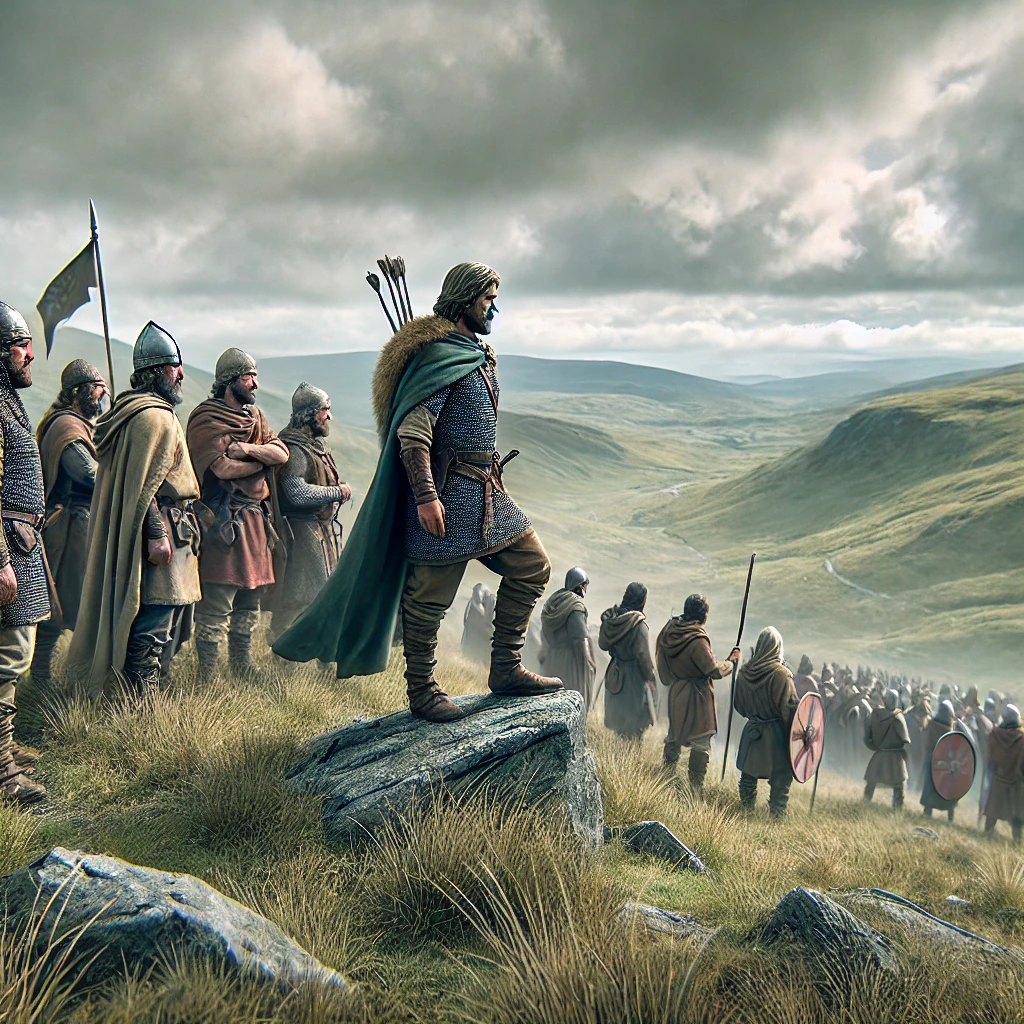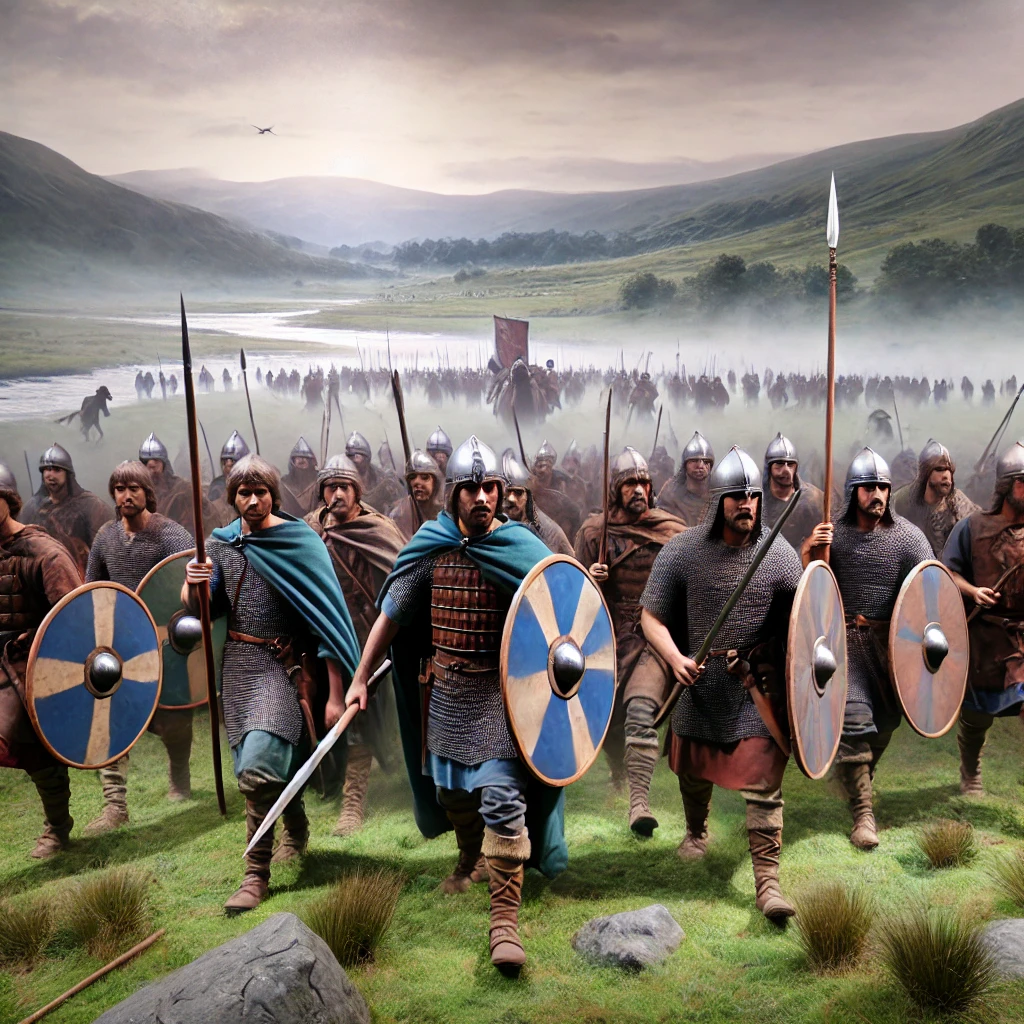Introduction: Who Was Cunedda Wledig?
Cunedda Wledig stands as one of the most influential figures within the early kingdom of Wales. A leader who laid the foundations of the Kingdom of Gwynedd in the 5th century AD, Cunedda’s legacy is woven into the very fabric of Welsh identity. Known for his unification efforts and fierce defence against foreign threats, Cunedda’s story is a remarkable tale of resilience, bravery, and cultural preservation. This post delves into the life and legacy of Cunedda Wledig, exploring how his journey from northern Britain to Wales created a dynasty that would shape the nation’s history for centuries.
Early Life and Background of Cunedda Wledig
Cunedda’s migration to Wales marked a turning point, blending the warrior culture of northern Britain with the traditions of Welsh tribes, laying a foundation for the Kingdom of Gwynedd.”
Source: Dr. David Howell, Historian of Early Medieval Britain, Aberystwyth University.
Cunedda Wledig was born in Manaw Gododdin, a territory in what is now southern Scotland, during a time of upheaval across the British Isles. The son of a noble family, Cunedda was groomed for leadership from a young age. His lineage traced back to warriors and chieftains, instilling in him a sense of duty and loyalty to his people. Known as a fierce warrior even in his youth, Cunedda gained a reputation for his strength and tactical skill, qualities that would serve him well as he ventured southward to Wales.
At the time, Wales was fragmented and vulnerable to outside threats, particularly from Irish raiders who frequently attacked the Welsh coast. Cunedda’s early experiences in Manaw Gododdin and his warrior heritage would become instrumental in his mission to defend Wales from these incursions. His move to Wales was a strategic decision, aligning his strength with a land in need of a powerful protector.
The Influence of Roman Withdrawal on Cunedda’s Rise
The Roman withdrawal from Britain in the early 5th century AD left a power vacuum that dramatically shifted the balance of influence across the region. With the Romans gone, native leaders like Cunedda saw new opportunities to unify and protect Welsh territories. The end of Roman rule freed local tribes from external control, setting the stage for Cunedda’s journey to Wales and his vision for a unified kingdom.
This absence of Roman influence allowed Cunedda to operate with greater autonomy, rallying local tribes who sought stability after years of foreign dominance. His leadership was timely, aligning with a period of Welsh history where self-governance and defence against new threats became paramount.
The Move to Wales: Defending Against Irish Raiders

The 5th century AD saw the British Isles besieged by various invaders, and Wales was no exception. Irish raiders had begun targeting the Welsh coast, pillaging villages and terrorising local communities. It was during this turbulent time that Cunedda Wledig received a call to defend Wales from these threats. Leading a group of his loyal followers, he migrated south to establish a foothold in Wales and bring stability to the region.
Upon his arrival, Cunedda quickly earned the respect and support of local Welsh tribes who recognised his strength and leadership. His primary mission was to push back the Irish raiders and secure the Welsh territories, particularly the northwest. Through a combination of military prowess and strategic alliances, Cunedda successfully defended the region, creating a sense of unity and security that had been missing.
The migration of Cunedda and his followers to Wales wasn’t merely a defensive act; it was the beginning of a new chapter for Welsh unity. With Cunedda’s leadership, the Welsh people experienced a period of renewed strength and resistance, giving rise to what would become the Kingdom of Gwynedd.
Founding of the Kingdom of Gwynedd

Archaeological findings in North Wales reveal fortifications and artefacts dating back to Cunedda’s era, supporting historical accounts of early defences established by Welsh leaders.
Source: Research published by the Council for British Archaeology.
The establishment of the Kingdom of Gwynedd was a monumental achievement for Cunedda Wledig. After securing the region against external threats, Cunedda set about unifying the local tribes under a single banner. By consolidating power, he created a stronghold that would endure for centuries, serving as a bastion of Welsh culture and identity. The foundation of Gwynedd symbolised not only military strength but also a deep-rooted commitment to preserving Welsh heritage.
Under Cunedda’s rule, Gwynedd became a model for governance and defence. His reign marked the beginning of a structured kingdom, where laws were established, and order was maintained. Through key alliances and military campaigns, Cunedda expanded Gwynedd’s influence across northwestern Wales, ensuring the safety of his people and establishing a lasting legacy. His descendants would go on to rule Gwynedd, defending it against future threats and solidifying its place in Welsh history.
The Kingdom of Gwynedd served as a foundation for future Welsh resilience. By uniting the tribes, Cunedda created a sense of national identity that persisted long after his death. His leadership became a defining chapter in Welsh history, with Gwynedd emerging as a symbol of strength and continuity for generations.
The founding of Gwynedd created a unified front in Wales, a critical step in resisting the growing influence of neighbouring kingdoms and preserving local customs.”
Source: Dr. Richard Williams, Author of The Early Welsh Kingdoms: A History.
The Legacy of Cunedda Wledig in Welsh Culture

The resilience of the Welsh people in defending their land and identity can be traced back to leaders like Cunedda Wledig, whose legacy as a defender of Gwynedd is deeply rooted in Welsh history.”
Source: Prof. Gwyn Thomas, Expert in Welsh History, Bangor University.
Cunedda Wledig’s impact on Welsh culture is profound. His role as a unifier and defender established a tradition of resistance and pride that continues to define Welsh identity. The people of Gwynedd revered him as a founding father, and his descendants continued his mission of safeguarding Welsh autonomy. This legacy of resilience and defiance became embedded in the Welsh psyche, inspiring future leaders and warriors.
The significance of Cunedda’s achievements is celebrated in Welsh folklore and historical records, which honour his contributions to the formation of a unified Wales. His legacy lives on in the cultural pride of Wales, a nation that has continually resisted external control and preserved its unique heritage. Cunedda’s life and accomplishments are a testament to the enduring spirit of the Welsh people, symbolising their unbreakable connection to their land and their history.
Key Takeaways
- Foundational Leader: Cunedda Wledig’s journey from Manaw Gododdin to Wales laid the groundwork for Welsh unity and the formation of Gwynedd.
- Defender of Wales: His migration and defence against Irish raiders brought stability to Welsh territories, making him a revered figure in Welsh history.
- Cultural Legacy: Cunedda’s rule created a lasting impact on Welsh identity, inspiring a sense of pride and resilience that endures in modern Wales.
- Unified Kingdom: The Kingdom of Gwynedd became a cultural and political stronghold, setting the stage for future resistance and continuity.
Conclusion: The Enduring Influence of Cunedda Wledig
The legacy of Cunedda Wledig resonates deeply in Welsh history. As a leader, defender, and unifier, he established a kingdom that would become a cornerstone of Welsh identity. The Kingdom of Gwynedd, born from his efforts, remains a symbol of the resilience and pride of the Welsh people. Cunedda’s story is more than a historical account; it is a narrative of strength, unity, and the indomitable spirit of Wales. Through his legacy, Cunedda Wledig continues to inspire Wales, a nation defined by its history and the enduring legacy of its founding heroes.
Matt






